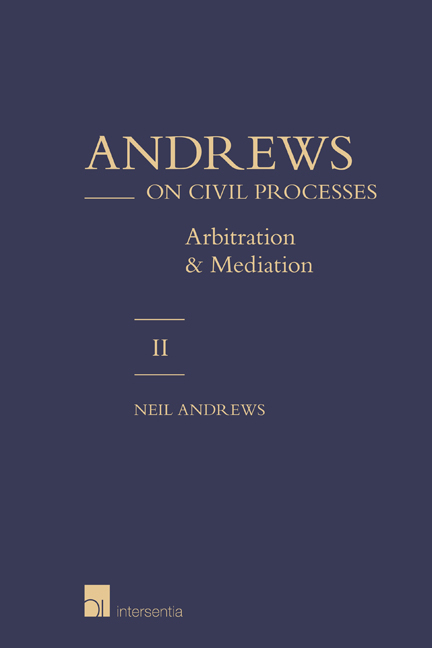Book contents
- Frontmatter
- Dedication
- CONTENTS VOLUME I
- Contents
- Table of Cases
- Table of Statutes
- Table of Statutory Instruments
- PART I MEDIATION
- PART II ARBITRATION
- Chapter 3 Commercial Arbitration: What Is It and Why Choose It?
- Chapter 4 The Major Principles of Arbitration and Litigation: A Comparison
- Chapter 5 Fundamental Features of English Arbitration
- Chapter 6 ‘The Seat’ and the Range of Relevant Laws
- Chapter 7 ‘Arbitrability’: Public Policy Limitations upon the Scope of Arbitration
- Chapter 8 A Confidential Process
- Chapter 9 Arbitration Agreements
- Chapter 10 Courts Giving Effect to Arbitration Agreements
- Chapter 11 Commencement of the Submission and Time Issues
- Chapter 12 The Tribunal's Appointment, Tenure and Immunity
- Chapter 13 Pre-Hearing Proceedings
- Chapter 14 The Hearing
- Chapter 15 Final Remedies, the Award, and Correction of the Award by the Tribunal
- Chapter 16 Fees, Expenses and Recoverable Costs
- Chapter 17 Arbitration Awards: Issues of Finality and Res Judicata
- Chapter 18 Challenges to English Arbitral Awards under English Law
- Chapter 19 English Enforcement of English Awards
- Chapter 20 Enforcement under the New York Convention (1958)
- PART III CONSUMER ADR
- Select Bibliography
- Index to Volumes I and II
Chapter 4 - The Major Principles of Arbitration and Litigation: A Comparison
from PART II - ARBITRATION
Published online by Cambridge University Press: 13 December 2017
- Frontmatter
- Dedication
- CONTENTS VOLUME I
- Contents
- Table of Cases
- Table of Statutes
- Table of Statutory Instruments
- PART I MEDIATION
- PART II ARBITRATION
- Chapter 3 Commercial Arbitration: What Is It and Why Choose It?
- Chapter 4 The Major Principles of Arbitration and Litigation: A Comparison
- Chapter 5 Fundamental Features of English Arbitration
- Chapter 6 ‘The Seat’ and the Range of Relevant Laws
- Chapter 7 ‘Arbitrability’: Public Policy Limitations upon the Scope of Arbitration
- Chapter 8 A Confidential Process
- Chapter 9 Arbitration Agreements
- Chapter 10 Courts Giving Effect to Arbitration Agreements
- Chapter 11 Commencement of the Submission and Time Issues
- Chapter 12 The Tribunal's Appointment, Tenure and Immunity
- Chapter 13 Pre-Hearing Proceedings
- Chapter 14 The Hearing
- Chapter 15 Final Remedies, the Award, and Correction of the Award by the Tribunal
- Chapter 16 Fees, Expenses and Recoverable Costs
- Chapter 17 Arbitration Awards: Issues of Finality and Res Judicata
- Chapter 18 Challenges to English Arbitral Awards under English Law
- Chapter 19 English Enforcement of English Awards
- Chapter 20 Enforcement under the New York Convention (1958)
- PART III CONSUMER ADR
- Select Bibliography
- Index to Volumes I and II
Summary
OVERVIEW OF THE PRINCIPLES APPLICABLE TO ARBITRATION OR TO THE JUDICIAL PROCESS
In chapter 25 of Volume I, it was suggested that there are five constellations of procedural principles relating to court proceedings, and the judicial process in general. Not all of these principles apply to arbitration.
For convenience, these major principles will be restated here briefly (those principles, namely II, IV, VI and XIV, which do not apply to arbitration will be marked in bold; as for the principle of finality, which is respected more intensely within arbitration law, when compared with litigation, this is underlined in the text below).
(1) ADVICE AND ACCESS: EMPOWERING THE PARTIES
I. Rights of Legal Consultation and Representation
II. Access to Court and to Justice (arbitration is an opting-out from public adjudication)
III. Protection against Bad or Spurious Claims and Defences
(2) CONDITIONS FOR SOUND DECISION-MAKING
IV. Judicial Independence (not a separate requirement in English arbitration law)
V. Judicial Impartiality
VI. Publicity and Open Justice (arbitration is a consensual retreat from open and public justice)
VII. Judicial Duty to Give Reasons
(3) AN EFFICIENT PROCESS
VIII. Judicial Control of the Civil Process to Ensure Focus and Proportionality
IX. Avoidance of Undue Delay
(4) A FAIR PROCESS
X. Judicial Duty to Avoid Surprise: The Principle of Due Notice
XI. Procedural Equality (equal respect for the parties)
XII. Equal Access to Information, including Disclosure of Information between Parties
XIII. Fair Play between the Parties
XIV. Accuracy of Decision-making (the arbitral tribunal is shielded from judicial scrutiny of the merits of the decision underpinning the relevant award – that is, the decision on the substance of the dispute; in England this shield applies to findings of fact and applications of foreign law, but section 69 of the Arbitration Act 1996 permits the High Court to control applications for review of arbitral findings of English law.)
(5) UPHOLDING JUDGMENT
XV. Finality (arbitration respects the principle of finality more intensely than court adjudication)
XVI. Effectiveness
We will see that the arbitral process substantially embodies the same fundamental principles as court proceedings. However, diff erences do exist: in respect of access (the choice of arbitration precluding resort to the court on questions concerning the merits or the substance of the dispute), publicity, accuracy, finality, and independence.
Information
- Type
- Chapter
- Information
- Andrews on Civil ProcessesArbitration and Mediation, pp. 113 - 142Publisher: IntersentiaPrint publication year: 2013
Accessibility standard: Unknown
Why this information is here
This section outlines the accessibility features of this content - including support for screen readers, full keyboard navigation and high-contrast display options. This may not be relevant for you.Accessibility Information
- 1
- Cited by
